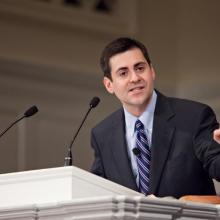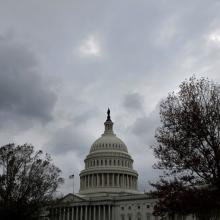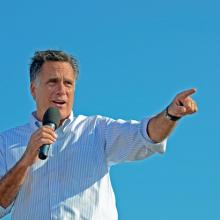Presidential Election
"They want their supporters to believe this is a divine call, which is not. I think they are manipulating their supporters," said the Rev. Wilybard Lagho, the Mombasa Roman Catholic archdiocese vicar general.
“God raised up, I believe, Donald Trump,” said former U.S. Rep. Michele Bachmann after he won the GOP nomination. “God showed up,” the Rev. Franklin Graham said to cheers at a post-election rally. “God came to me, in a dream last night, and said that Trump is his chosen candidate,” said the televangelist Creflo Dollar.
For those who share this view, Trump’s victory was nothing short of miraculous, especially given that he beat out 16 other in the Republican primaries — some of them evangelical Christians with long political resumes.
In the aftermath of this presidential election, I can’t help but see striking similarities between what happened inside the religious cult of my childhood and what played out for us, in the political cult of personality.
Here was the larger-than-life leader drawing followers to himself, despite the facts of his poor character, lack of experience, and even despite the fact that media, pundits, and pollsters claimed he wouldn’t — couldn’t — win.
I am upset by the results of the election, and I am particularly saddened that 81 percent of white American evangelicals got into bed with a monster on Nov. 8. But I am also encouraged and have not lost hope.
Here’s why:
Around 11:15 p.m. Tuesday, my 15-year-old daughter, frustrated by all she was seeing on the television, stormed out of the room and announced: “Dad, I am going to bed. I am embarrassed for my country.”
Back when so many thought Hillary Clinton would be the next president, two dozen African-American leaders wrote to the Democratic nominee, asking her to explain her policies related to the poor and the police.
African Methodist Episcopal Bishop Frank M. Reid III said black clergy will make some of the same demands of President-elect Donald Trump.

Image via katatonia82/Shutterstock.com
While Americans watch Hillary Clinton and Donald Trump fighting to the finish, in a noisy and polarized campaign, Germans are quietly debating their own presidential election in far different terms.
Among the names put forward as candidates are two leading Protestant bishops — one of them a woman — and even a respected Muslim writer.
During his earthly ministry, Jesus served fully as God’s agent and modeled God’s value system in everything he did. Demonstrating God’s love, Jesus affirmed the divine image in flawed humans of every background: a Samaritan woman of ill repute, a wealthy man who exploited the poor, and a Roman centurion or military leader whose son needed healing. In the same way, Jesus’ followers are fully pardoned from all sin by his sacrifice on the cross to become God’s agent. As “new creations” and “agents of reconciliation,” followers of Jesus are spiritually equipped to love those outside their comfort zone, see all others as God sees them, and build bridges across many divides.

Photo via House GOP / Flickr
Former Speaker of the House John Boehner visited Stanford on April 27 to chat about his time in Washington, D.C., but the conversation quickly turned to what he thinks of the current Republican presidential candidates.

Russell Moore. Image via Theology147/Wikimedia Commons
Russell Moore may be president of the Ethics & Religious Liberty Commission of the Southern Baptist Convention. But don’t call him an evangelical — at least not until the current election cycle ends.
Moore started introducing himself as a “gospel Christian” a few weeks ago. That’s because, he said, “The word ‘evangelical’ has become almost meaningless this year, and in many ways the word itself is at the moment subverting the gospel of Jesus Christ.”
Republican presidential frontrunner Donald Trump convincingly won the Nevada caucuses last night but he is still struggling in what might be called “the Pope Francis primary.” In a joint op-ed in today’s edition of The Hill, the first Hispanic woman elected as a bishop of the United Methodist Church and a Catholic nun who is an outspoken Washington lobbyist for social justice causes blast Trump for the views he expressed in picking a fight with the pontiff over what it means to be a Christian.

Image via REUTERS/Randall Hill/RNS
The run-up to the Feb. 1 Iowa caucus has shifted from who is toughest on ISIS or immigration or Obamacare to an all-out scramble to court evangelicals — an estimated 60 percent of Republican caucus likely voters. However, a new report from the Public Religion Research Institute shows that evangelicals may be sharing their November election clout with a different voting bloc. PRRI found about one in four Iowans identify as evangelical but a similar percentage say they have no religious identity, the nones.

Image via Alexandru Nika / Shutterstock.com
As the political stage gets set for the 2016 U.S. presidential election, how should Christians engage?
One unexpectedly relevant guide can be found in the book of Judges, which more than any other book in the Bible, describes a divinely-inspired form of leadership similar to our own. Between the era in which God spoke through Moses, and the one in which God worked through kings like David, came an era — lasting over four centuries — during which God raised up a series of individuals who had no predefined lineage, accomplishment, or gender marking them as leadership material. These judges were not judicial so much as military leaders, fulfilling a role strikingly similar to that of the American president.
Another notable commonality Americans share with the Israelites of Judges is the crisis in which we find ourselves. Apostasy, from the Greek word apostasia, means “an abandonment of one’s previous faith.” Then as now, a nation was turning away from God.

Image via Joshua Roberts/REUTERS/RNS
Sen. Bernie Sanders spoke Sept. 14 at an evangelical school where he framed his fight against wealth and income inequality in terms of morality and justice.
Sanders, a Vermont independent running for the Democratic presidential nomination, conceded that many in the audience at Liberty University disagree with his support for abortion rights and gay marriage. But he suggested they might agree that, at a time when “a handful of people have wealth beyond comprehension,” other people shouldn’t have to struggle to feed their families, put a roof over their heads, or visit a doctor.
“When we talk about morality and when we talk about justice, we have to, in my view, understand that there is no justice when so few have so much and so many have so little,” he said to applause from the audience of nearly 12,000.
My early voting ballot is almost complete. I have done my reading, finished my research, and ignored a sufficient amount of robo-calls and attack ads. I have made my choices for county school superintendent, state representatives, and even U.S. Senator. But there is a gaping hole at the top of my ballot ...
It is November 6, 2012, and after more than a year of carefully following the presidential campaigns I still do not know which candidate I am going to vote for. I am an independent voter but registered as a democrat. On my Facebook page I identify my political position as "a morally-conservative Democrat or a fiscally-irresponsible Republican."
"In a democracy, the people get the government they deserve." – Alexis de Tocqueville
With the Democratic and Republican national conventions behind us, and an increase of political campaigning in front of us, we recognize the timeliness of the above quotation from Alexis de Tocquville. In a democracy the citizens choose their government, thus we indeed receive the government we deserve. As Lisa Sharon Harper recently stated:
"In its purest form, politics is simply how we organize our life together in society…in a Democratic Republic like our own, the [people are] ultimately responsible for the policies, laws, and structures that guide daily life. As we vote for candidates and ballot measures, we shape our society."
With such thoughts in mind, we affirm the collective ability to “shape our society," but we do so not only through the ability to choose our candidates and pass ballot measures, but we also possess the capacity to shape the process of how our leaders and policies are selected. In other words, while many complain about the high quantity and low quality of political campaigns, we are confronted with a harsh reality: In a democracy, we get the political campaigns we deserve.
Mitt Romney says in a new interview that one of the reasons he’s distressed about disclosing his tax returns is that everyone sees how much money he and his wife, Ann, have donated to his Mormon church, and that’s a number he wants to keep private.
“Our church doesn’t publish how much people have given,” Romney tells Parade magazine in an edition due out on Aug. 26. “This is done entirely privately. One of the downsides of releasing one’s financial information is that this is now all public, but we had never intended our contributions to be known. It’s a very personal thing between ourselves and our commitment to our God and to our church.”
Romney has released his 2010 tax returns in his White House campaign and, so far, a summary of last year’s tax information. But despite pressure from Republican opponents in the primaries and President Obama’s re-election campaign, Romney has refused to disclose more.
While it may not be a major reason, Romney says disclosing his charitable donations isn’t something he wants to do.
Most Mormons in Utah believe that Mitt Romney’s rise to become the likely GOP presidential nominee is a good thing for the Church of Jesus Christ of Latter-day Saints. But many do not trust the media to cover the church fairly, according to a new poll released on June 25.
The study, conducted by Key Research and Brigham Young University’s Center for the Study of Elections and Democracy, is believed to be the first to gauge Mormons’ reaction to Romney’s barrier-breaking achievement. He is the first Mormon to clinch the presidential nomination of a major U.S. political party.
More than eight in 10 Utah Mormons said they are “very excited” or “somewhat excited” about Romney’s feat. Nearly as many (77 percent) said his nomination is a good thing for the LDS church; just 2 percent told pollsters it was a negative development.
The Iowa Caucus is today and the nation is watching. It’s a lot of attention for a relatively small part of the nation voting. Having grown up in New Hampshire, I know that kind of limelight well.
When I was a pretentious 11 year old, I wasn’t able to vote but nonetheless assumed I had the right to meet every candidate who was seeking their party’s nomination. When President Bill Clinton came through the state I remember being particularly annoyed that he just drove by and waved instead of talking with me.
I still haven’t let that one go.
There are a lot of concerns about the undue influence early voting states wield in the primary process. The fact that I got more face time with candidates as an elementary school pupil than most voters will get in a lifetime is problematic.
It’s been a bad year, and the 2012 election year looks to be even worse.
Don’t get me wrong — there were many good and even wonderful things about 2011. I can point to weddings, great things in our family lives, wonderful moments with our children, acts of courage in our local and our global communities, and heroic accomplishments by people of faith and others of good will.
But when it comes to politics and to the media, 2011 was an abysmal year.
Washington is a dysfunctional place where we make the most important decisions about how our public resources should be allocated amidst artificial deadlines set entirely by ideological politics instead of the common good. Rational, thoughtful ideas for reducing the national deficit (while at the same time protecting our vital social safety nets and producing needed jobs) have been replaced by the politics of blame and fear.
And winning — at seemingly any cost — has trumped governing. To disagree with the opposition isn’t enough. Now politicians and pundits feel compelled to destroy their opponents’ character, integrity, patriotism, and even attack their faith.
Rick Perry was recently asked by a nine-year-old "If you were a super hero, what kind of super hero would you be?" His answer to the child's benign question was simultaneously predictable and profound: Superman.










